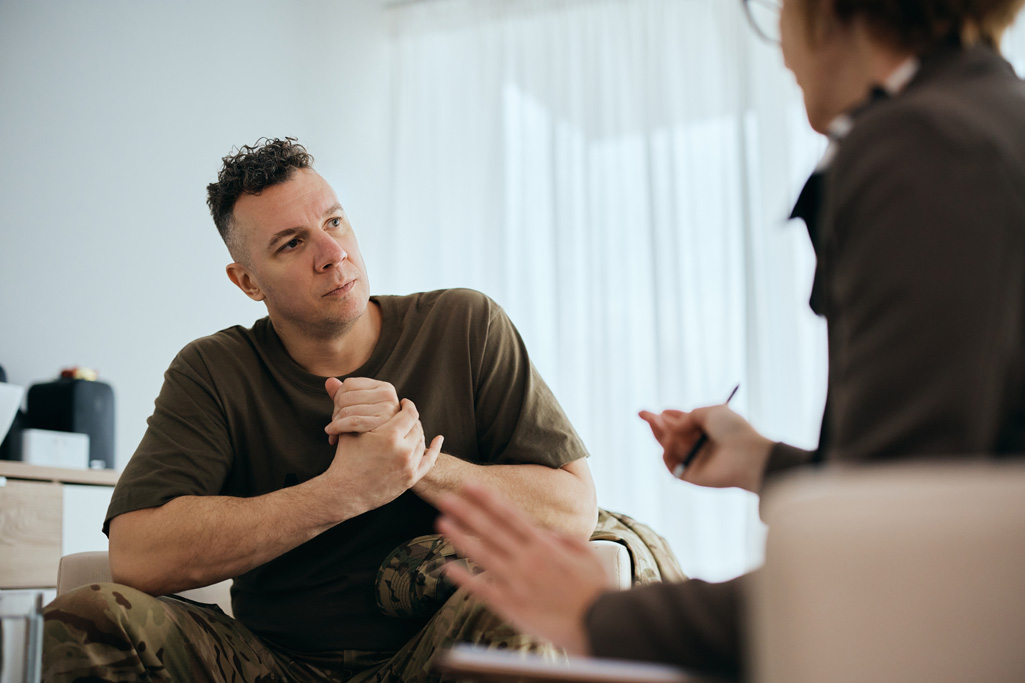By Blake Bourne
The military community provides a strong sense of belonging, purpose and stability for service members and their families. This environment, supported by intentional efforts from command teams across branches, fosters wellness, connection and care. During service, members benefit from robust social networks, professional purpose and access to high-quality medical and community care.
While a resilient military force should translate into a strong veteran population, the transition from military to civilian life can be challenging. This shift often removes familiar structures and support systems, making it difficult for veterans to find purpose, maintain financial stability and navigate post-service care. These challenges can exacerbate existing mental health issues, post-traumatic stress disorder (PTSD), or traumatic brain injuries (TBI).
Veteran transition stress and resulting mental health challenges underscore the need for targeted interventions, community-based resources and comprehensive mental health support that can provide meaningful assistance—before, during and after transition.
The Scope of Issues
Not only do mental health challenges impact veterans’ integration into civilian life, but it also puts them at an increased risk of suicide. Veteran suicide rates are consistently higher than those of the general population. Veterans are 1.5 times more likely to die by suicide than non-veteran adults, and the suicide rate for veterans is 50% higher than the national average for non-veteran adults.
One study done by RAND revealed that 1 in 5 U.S. veterans of Iraq and Afghanistan experience PTSD or depression. Military service has a significant impact on mental health, especially for those who have been deployed to combat zones. Having a history of multiple deployments, being exposed to combat or hostile environments, and service-related trauma can all be additional risk factors for veterans.
The range of mental health issues affecting veterans is broad and often complex. Veterans face elevated risks for PTSD, TBI, depression, anxiety and substance use disorders. These conditions can manifest in various ways, sometimes occurring simultaneously, which complicates diagnosis and treatment and ultimately impacts their quality of post-service life.
Barriers to Care
Despite remarkable steps by both the U.S. Department of Defense and Veteran Affairs to improve access and reduce barriers, many veterans continue to face significant barriers to accessing care. RAND reports that only about half of veterans who need mental health care receive it. Some of the barriers veterans face include stigma surrounding mental health in the military community, concerns about the impact of seeking care on a veteran’s military career and lack of understanding about available resources.
Addressing Veteran Mental Health
Community engagement
Community support plays a vital role in promoting veteran mental health. Fostering supportive environments where veterans feel understood and valued can significantly impact their mental well-being. Veterans Bridge Home (VBH) organizes events and workshops across different communities in the Carolinas to help veterans feel connected and support their well-being.
Peer support programs
Peer support programs provide a platform for veterans to connect with others who understand their experiences, fostering a sense of belonging and reducing feelings of isolation. These programs also empower veterans to take an active role in their recovery, and participants in these programs often exchange valuable information about available resources, treatment options and support networks.
VBH’s peer support program, Battle Buddies, aims to combat veteran suicide and provide mental health support. It is an upstream suicide prevention effort aiming to reduce veteran suicide by training those who go through the program to recognize when their fellow veterans need a sympathetic ear and help navigate a period of transition or a connection to medical assistance.
Comprehensive screening & early intervention
Comprehensive screenings and early intervention play a crucial role in addressing veteran mental health by enabling timely identification and treatment of mental health issues. In 2023 alone, VBH conducted over 1,300 comprehensive screenings. By conducting these screenings, VBH found that many veterans may not explicitly seek mental health support or address underlying social determinants of health. However, when presented with the opportunity to learn about available community resources and explicitly discuss mental health services, they often respond positively. It is important that conversations around mental health are initiated, as many veterans may not want to bring it up unless asked.
One of the primary benefits of screenings is early detection, which helps identify mental health concerns in their initial stages. Early detection and intervention can lead to better outcomes for veterans and reduce the risk of more serious mental health crises, including suicide.
Networks of support
Building cohesive and holistic networks of local support allows veterans and community members to know where to go for help and, ultimately, leads to fewer gaps in care. This approach, pioneered by VBH, involves developing public-private partnerships at local, state and regional levels, resulting in increased care and better outcomes for veterans.
Training for health care providers
Equipping professionals with a deeper understanding of military culture and the unique challenges faced by veterans enables a more effective identification and treatment of mental health issues. Health care providers who receive specialized training may be better prepared to recognize the signs of conditions like PTSD, depression and anxiety in veterans and can offer more tailored and empathetic care.
Training also helps to reduce the stigma surrounding mental health in the military community by normalizing discussions about these issues and encouraging veterans to seek help.
Helping veterans and their families find the sense of community, purpose and stability that were prevalent during their service is essential for helping them integrate successfully into their civilian lives and communities. By establishing comprehensive support systems that incorporate community engagement, peer support, early intervention and care networks of specialized organizations, communities can effectively address the complex mental health challenges faced by veterans and empower them to thrive in civilian life.
For veterans in crisis, immediate help is available through the Veteran Crisis Line: Dial 988, then press 1 or text 838-255.
Blake Bourne serves as the executive director for  Veterans Bridge Home, a nonprofit dedicated to connecting, leading and advocating for veterans and their families. He served in the U.S. Army as an Infantry Officer for six years, was stationed in Georgia, Germany and North Carolina and deployed to Iraq twice.
Veterans Bridge Home, a nonprofit dedicated to connecting, leading and advocating for veterans and their families. He served in the U.S. Army as an Infantry Officer for six years, was stationed in Georgia, Germany and North Carolina and deployed to Iraq twice.
Read more articles for the Veteran Community here.


